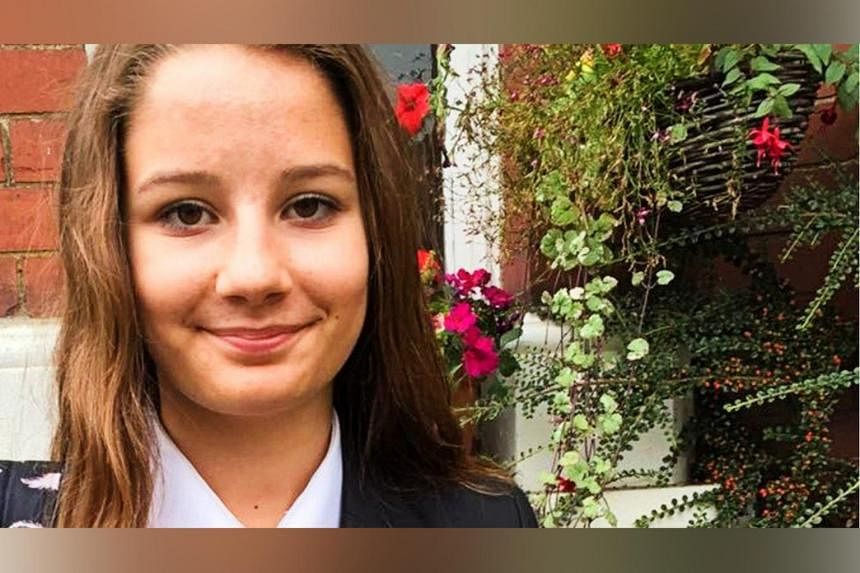On the surface, Molly Russell was a typical British teenager. She liked rock bands and Harry Potter.
But in the last months of her life, she had fallen into a deep, dark rabbit hole dug for her and millions of other teens like her by social media firms bent on keeping as many users engaged on their platforms as long as possible as they rake in billions in profits.
A week-long hearing that looked into Molly's death in 2017 portrayed a 14-year-old who, in her father's words, was "positive, happy, bright" and "destined to do good".
She was a fan of the musical Hamilton and the Harry Potter movies. She liked the rock band 5 Seconds Of Summer, and played the lead role in a school show.
She was into music, fashion and jewellery.
"It's all too easy to forget the person she really was: Someone full of love and hope and happiness, a young person full of promise and opportunity and potential," said Mr Ian Russell, Molly's father.
On a typical evening on Nov 20, 2017, Molly had dinner with her family and then sat down with them to watch a popular TV show.
"Everybody's behaviour was normal," Molly's mother, Janet, would recall to police.
The next day, at 7am, Molly was found lifeless in her bedroom. She was only 14.
At the end of an inquest into her death on Friday, the senior coroner at North London concluded that she took her life after suffering through what her father described as a "demented trail of life-sucking content" peddled by social media.
Mr Andrew Walker, the coroner, said looking at Molly's case as a simple case of suicide was taking the tree for the forest.
Molly fell into "the bleakest of worlds", her father said in the hearing.
"It's a world I don't recognise. It's a ghetto of the online world that once you fall into it, the algorithm means you can't escape it and it keeps recommending more content. You can't escape it," he said.
A shadow within
There were warning signs.
Mr Russell said in the last year of her life, Molly had become "more withdrawn" and spent more time alone in her room.
He said he tried to reach out to his daughter. She told him it was "just a phase I'm going through".
Her behaviour mimicked "normal teenage mood swings", said Mr Russell. But it masked a darkness roiling her to her core that would later be revealed in thousands of her own posts on the photo sharing apps Instagram and Pinterest.
Out of over 16,000 Instagram posts she saved, liked or shared, some 2,000 were images that were dark, miserable and depressing.
There were photos and videos that romanticised self-harm and suicide.
There were clips from 13 Reasons Why, the American TV series about a teenager's suicide.
Molly would sometimes binge-watch videos that just drew her deeper into depression: short clips about dying by suicide or inflicting harm on oneself, with nooses, pills and razor blades.
A member of Mr Walker's staff had to leave the room while these contents were being shown in court.
A consultant child psychiatrist told the hearing he could not sleep well for weeks after viewing what Molly saw on Instagram.
On Pinterest, Molly searched for posts with keywords like "depressing quotes (sic) deep" and "suicial (sic) quotes".
She had one board - titled "nothing to worry about" - that had close to 500 images, some of them related to anxiety, depression and, again, self-harm and suicide.
Pinterest sent her e-mails recommending titles such as "10 depression pins you might like".
On Twitter, she reached out to Salice Rose, an "influencer" who had been talking about her own struggles with depression.
But it was like "calling out into a void", said Mr Russell.
End the life-sucking content
Called out in court, Ms Elizabeth Lagone, the head of health and wellbeing at Meta, which owns Instagram and Facebook, defended the suitability of some posts,
She said those were "safe" for children, as those were meant to raise awareness about a user's mental state and encouraged them to share their feelings.
But when pressed, Ms Lagone conceded that some posts were clearly indefensible, and she apologised for those.
Mr Oliver Sanders, the Russell family's lawyer, demanded a more thorough accounting.
He said Instagram was choosing to put content "in the bedrooms of depressed children".
"You have no right to. You are not their parent. You are just a business in America," he told Ms Lagone.
After the hearing concluded, Mr Russell said: "If this demented trail of life-sucking content was safe, my daughter Molly would probably still be alive and instead of being a bereaved family of four, there would be five of us looking forward to a life full of purpose and promise that lay ahead for our adorable Molly."
He said he doesn't want his daughter to just be another cautionary tale.
"It's time the toxic corporate culture at the heart of the world's biggest social media platform changed… It's time to protect our innocent young people, instead of allowing platforms to prioritise their profits by monetising their misery." he said.

